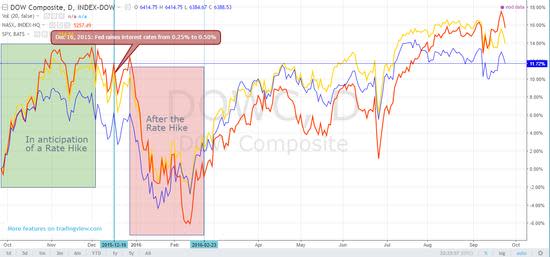Should Investors Be Binge Buying in Anticipation of Another Rate Hike?
- By Nicholas Kitonyi
The Federal Reserve, or the Fed, plays a pivotal role in the global markets. If this was not true, most investors around the world would not be worried about whether or not the U.S. base interest rate is raised before the end of the year.
In the Federal Reserve committee meeting held last week, it became clear that interest rates could still go up before the end of the year despite the committee voting on the rates to remain unchanged for the time being. Analysts and investors are still worried an interest rate hike will come in December.
Warning! GuruFocus has detected 3 Warning Sign with BUD. Click here to check it out.
The intrinsic value of SPY
What does this mean?
In most cases, when the buzz about interest rates hits the headlines, most people think of the impact on financial markets. However, the effects run down to the simple consumer, whether they are a parent paying for a mortgage or a new college graduate about to buy their first car.
When interest rates rise, it becomes more expensive to borrow money, and therefore, you end up paying more for your mortgage and car loans. Conversely, when interest rates are low, the threat of inflation arises while questions begin to float around in the direction of the economic health of a nation. This article published on ProfitF discusses in depth how interest rate decisions could affect markets as well as the public in general.
For now, I am more interested in what we should look forward to regarding the current situation of U.S. interest rates and the impending rate hike later this year.
In the wake of the Federal Reserve voting against raising interest rates, U.S. stocks rallied across the board with the Dow Jones Industrial Average, Nasdaq Composite Index and S&P 500 all recording gains.
NASDAQ gained 53.83 points to close at 5295.18 on the day, whereas S&P 500 saw a rise of 23.36 points to close at 2163.12. On the other hand, the Dow gained 163.74 points to close at 18293.70. This shows that the news of interest rates remaining unchanged for the time being triggered a positive reaction from investors.
However, analysts who prefer to scrutinize information further could argue that the fact the committee did not completely rule out raising interest rates this year meant the economy is still in a position of strength, even given the upcoming presidential election. The anticipation of another interest rate hike seems to fuel demand in the market more than the actual increase in the base interest rate.
For instance, towards the end of last year, U.S. stocks rallied to record highs with the Dow, NASDAQ Composite and the S&P 500 (SPY) leading by example.

TradingView Chart via ProfitF.com
However, after the rate hike at the beginning of 2016 , stocks seemed to cave in as the market underwent what investors believed to be a major correction. It was not until late February that stocks peaked again. At this point, the Federal Reserve began to shower the market with positive information on another rate hike.
So, what if Fed raises interest rates in December?
Most investors and traders anticipated that the Federal Reserve would not increase interest rates this month. Now, with the elections on the way, the next realistic time to raise interest rates would be December. The Federal Reserve Committee will meet again in November, but it is unlikely that interest rates would be raised in an election month. As such, December is now the time to look forward to.
On the other side of the globe, European and Asian countries are trying to keep their interest rates checked at lower levels due to economic uncertainties. High interest rates are never good for any ailing economy, which suggests that while the U.S. appears to be in the clear to tweak its base interest rate, most of the other developed countries are still struggling economically. Central banks in Europe are continuing to push the rates down, whereas Japan leans towards negative rates.
The U.S. has proven that despite the unimpressive status of other top global economies, it can still improve independently, which means that if interest rates were to go up again, then it could be possible to cope with the ripple effect from slowing global economies.
Stocks have already rallied significantly this year, which means that another major rally after the rate hike is unlikely. Nonetheless, this year, it won't be just about the rate hike. The U.S. economy will be readying itself for another leader early next year, and who knows what policies the next POTUS will bring to the table.
Conclusion
In summary, sometimes stocks do well when interest rates are low, and there is some positivity from within the corridors of the Federal Reserve with regard to economic status and the potential for a rate hike.
However, if the Fed was to increase rates and the economy fails to respond accordingly, then it could hurt the markets as seen following the last rate hike in December 2015.
This ultimately means that investors should look more towards stability rather than another market rally should the Fed choose to play that card. On the flip side, failure to raise interest rates this year could raise concerns over the U.S. economic status.
Disclosure: I have no position in any stock or commodity mentioned in this article.
Start a free 7-day trial of Premium Membership to GuruFocus.
This article first appeared on GuruFocus.
Warning! GuruFocus has detected 3 Warning Sign with BUD. Click here to check it out.
The intrinsic value of SPY
